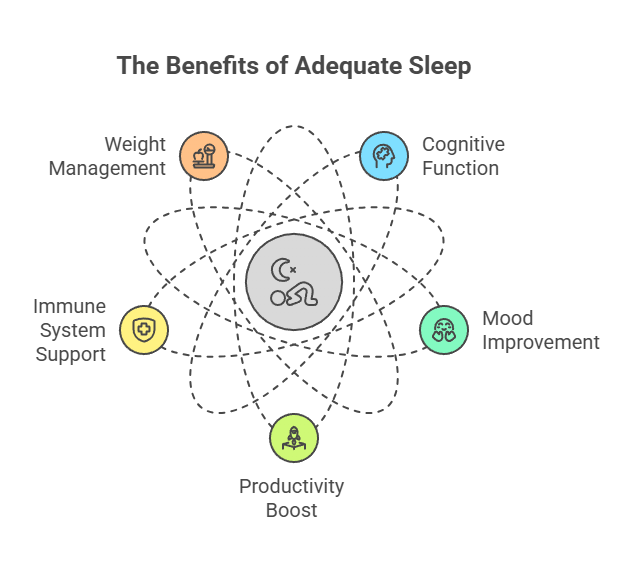The Power of Sleep: Why Getting Enough Sleep is Important for Your Health and Happiness
Benefits of enough sleeping
In today’s busy world, we frequently prioritise work, social obligations, and endless scrolling on our phones and tablets over sleep. But what many people don’t know is that sleep isn’t just a luxury; it’s an essential part of good health, just like eating well and working out daily. Knowing the amazing benefits of getting enough sleep and the terrible effects of not getting enough can change how you schedule your daily rest.
Why do you need more sleep than you think?
The time you spend sleeping is not just “downtime” for your brain. Even though you’re resting happily, your mind and body are very busy doing important repair and maintenance work. During this time, your brain works to store memories, process the day’s information, and even get rid of harmful chemicals that may play a role in developing diseases

The Wonderful Advantages of Getting Enough Sleep
Health Benefits for the Body
Getting enough good sleep is like pressing a reset button for your body, and it has many health benefits. Your immune system makes infection-fighting chemicals like antibodies and cytokines while you sleep. This makes you less likely to get sick and helps you get better faster if you do get sick. Good sleep also helps you keep a healthy weight by controlling the hormones that make you feel hungry and full. Specifically, it lowers ghrelin (the hunger hormone) and keeps leptin levels normal (the satiety hormone).
Advantages for your mind and brain
Getting enough sleep is very good for your brain and your mental health. Getting enough rest makes it easier to focus, make choices, solve problems, and learn new things. It also helps you remember things by turning short-term memories into long-term ones. This way, you can remember what you’ve learnt all day.
When it comes to your emotions, getting enough sleep naturally helps keep your mood stable. Getting enough rest makes it easier to deal with stress, keep your emotions in check, and interact with others in a good way. Sleep can also help lower stress by keeping cortisol and other stress hormones in check in your body.

The Very Bad Effects of Not Getting Enough Sleep Our Health and Mood
Not getting enough sleep has many negative effects, not just being tired the next day. Not getting enough sleep has a chain reaction of bad effects on your body and mind that can last for a long time or a short time.
Immediate results of not getting enough sleep are:
Focus and decision-making skills are affected.
Getting more angry and having mood swings
Your immune system is weaker, which makes you more likely to get diseases.
Accidents are more likely to happen, and people respond more slowly.
Trouble controlling your hunger, which causes you to want to eat
Long-term health risks of not getting enough sleep include:
Almost three times as likely to get type 2 diabetes
People who sleep less than 5 hours a night have a 50% higher risk of being overweight.
More likely to experience anxiety and depression disorders
Easy Ways to Get a Better Night's Sleep
Changing big parts of your life won’t be needed to get better sleep. Set a regular sleep routine by going to bed and getting up at the same time every day, even on weekends. Set up a relaxing routine for before bed that starts 30 to 60 minutes before you go to sleep.
To get a good night’s sleep, keep your bedroom dark and quiet. Don’t use electronics for at least an hour before bed, because the blue light from them can stop your body from making its own melatonin. Regular exercise during the day can also help you sleep better, but don’t do anything too intense right before bed.
In conclusion,
Getting enough sleep isn’t a waste of time; it’s an investment in your health, your ability to do things, and your general happiness. You’re taking a big step towards better physical health, better mental performance, and better emotional stability when you make quality rest a priority and understand how much it affects your health. Remember that getting enough sleep isn’t just for you; it’s important for everyone else as well.
Article Links
If you want to read more articles related to sleep and health, such as Role of good sleep in a healthy lifestyle, you can click these links.
1. https://balancedlifes.com/10-best-ways-to-improve-sleep-build-better-sleep/.
2. https://balancedlifes.com/10-amazing-benefits-of-sleep/
3. https://balancedlifes.com/11-best-foods-for-better-sleep-that-help-you/
4. https://balancedlifes.com/bedtime-routine-tips-for-deep-restful-sleep/
